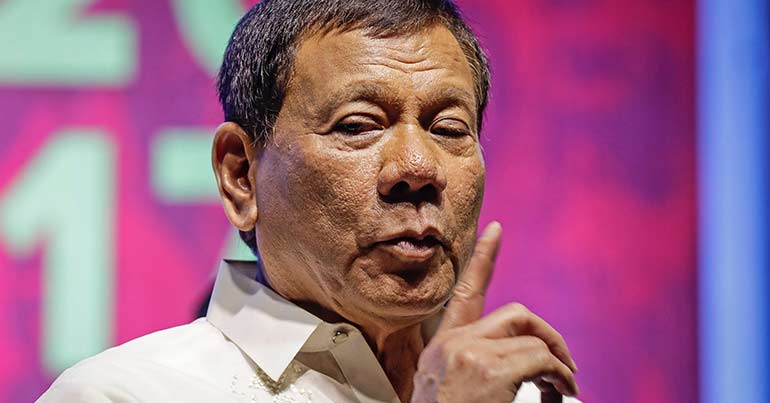Philippine President Rodrigo Duterte has lashed out against the International Criminal Court, which is investigating him for crimes against humanity, saying other leaders should follow his example by pulling out of the treaty

Duterte has urged other countries to withdraw from the International Criminal Court (ICC), accusing the court of unfairly targeting his government over a bloody war on drugs that has claimed the lives of more than 12,000 people.
His comments come just a few days after announcing that he himself intended to end the Philippines’ participation with the court, which is gathering evidence on him and other government officials, seeking to ascertain whether crimes against humanity have taken place during his drug war.
“I said withdraw simply to announce to the world…and I will convince everybody now who (is) under the treaty: get out, get out. It is rude,” he said during a speech to Philippine Military Academy graduates on Sunday.
He went on to accuse the ICC of “going after blacks” and added “It is not a document that was prepared by anybody. It’s an EU-sponsored (treaty).”
Last month the ICC started preliminary inquiries into Duterte’s violent clampdown on people working in the illegal drugs trade. Rights groups say that the bloody campaign has led to thousands of extrajudicial killings and claimed the lives of innocent children.
The ICC is a permanent international court established in 2002 to investigate, prosecute and try individuals who have committed genocide, crimes against humanity, war crimes or the crime of aggression.
Duterte announced last week that the Philippines would be withdrawing its ratification of the treaty, saying his decision was a stance against “those who would politicise and weaponise human rights.”
The controversial leader said that the ICC “is being utilised as a political tool against the Philippines” and that he intends to withdraw “given the baseless, unprecedented and outrageous attacks on my person as well as against my administration” by the court and by United Nations officials, the Wall Street Journal reported.
James Gomez, Amnesty International’s regional director for Southeast Asia and the Pacific, criticised Duterte’s decision to withdraw from the treaty, which the country only ratified in 2011.
“Powerful individuals in the Philippines were more interested in covering up their own potential accountability for killings than they were in ensuring justice for the many victims of the country’s brutal war on drugs’,” Gomez told the Guardian.
However, Duterte’s decision to withdraw from the court will not have an impact on the ICC’s investigation. According to the statute, pulling out of the treaty takes one year and “shall not affect any cooperation with the court in connection with criminal investigations.”
If the Philippines does end its participation with the Court, it will be only the second country to do so after Burundi withdrew in 2017.
International Criminal Court
Duterte urges countries to withdraw from 'rude' ICC
Philippine President Rodrigo Duterte has lashed out against the International Criminal Court, which is investigating him for crimes against humanity, saying other leaders should follow his example by pulling out of the treaty

